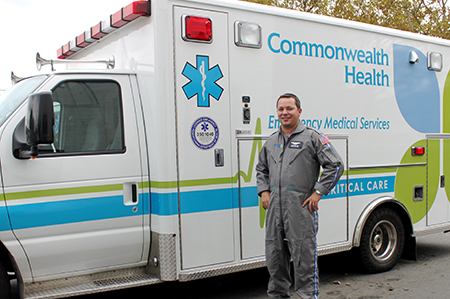Friday, Oct 17, 2014
Kirk Hinkley ’00 is former military flight surgeon and current emergency medicine physician and administrator
by Adam Grybowski
Kirk Hinkley ’00 sees bad things happen to good people every day.
A former military flight surgeon and current emergency medicine physician and administrator, Hinkley tends to the wounded under circumstances that mean the difference between life and death.
While overseas in Iraq and Afghanistan, soldiers suffering from battlefield injuries were entrusted to his care. They were most often the victims of IED explosions. Less often, they had been shot. Some involved traumatic amputations of limbs; others needed care for heart attacks, strokes, even complications of Lyme Disease. They all came under Hinkley’s supervision.
“When you talk about the worst of our wounded warriors, that’s who we took care of,” he says.
Despite seeing the horrors of war first hand, Hinkley, 36, says his experiences never felt traumatic. “The stress didn’t really get to me,” he says. “The pace and the acuity of the situation was something I enjoyed rather than ran from.”
The Medical Director and Chairman of the Emergency Department at Moses Taylor Hospital in Scranton, Pa., Hinkley also serves as the Medical Director for Commonwealth Health EMS and Commonwealth One Air Ambulance. His current work in various facets of emergency medical services mirrors — to a degree — the work he performed as a flight surgeon in the Air Force.
“It was a tremendous honor to make an impact on the individuals who were the real heroes,” Hinkley says. “I was given the opportunity to take care of the people you read about in the newspaper. I feel like that will be the highlight of my entire career.”
The Air Force recognized Hinkley as its Flight Surgeon of the Year in 2011 and, in April, the Penn State Alumni Association gave him its Alumni Achievement Award at a dinner ceremony for reaching “an extraordinary level of professional accomplishment by the age of 35 or younger.”
Hinkley earned his bachelor’s degree in biology at Rider before entering medical school at Penn State. He knew he wanted to be a doctor ever since second grade, when he imagined he’d become a brain surgeon.
As a student at Rider, Hinkley worked in the lab of Dr. Jim Riggs, a biology professor, studying B-cell lymphoma. Upon graduating, he presented a paper on the subject at a national convention — a “unique experience,” he says, for a recent graduate. His work in Riggs’ lab would satisfy the research requirement for medical students at Penn State. “It’s pretty uncommon for undergrads to have research experience, and that put me quite a bit ahead of my peers,” he says.
He qualified and earned a scholarship through the Air Force his senior year at Rider, when he was commissioned as an officer. He served as a reservist during medical school and would go onto active duty after graduating. He received his emergency medicine training in a joint military-civilian setting in Dayton, Ohio, where he lived for three years after graduating medical school.
Following resident training training, Hinkley was stationed for four and a half years at Keesler Air Force Base in Biloxi, Miss., where he served as part of the Air Force’s Critical Care Air Transport Team during deployments. The first of his three deployments brought him to Iraq and Afghanistan, where he tended to the wounded en-route to Ramstein Air Base in Germany. In his second deployment, he brought wounded soldiers from Germany back to military hospitals in the U.S., such as Walter Reed Army Medical Center. During his third deployment, to Haiti, he assisted in relief efforts following the devastating earthquake in 2010.
“Fortunately, I lost no one the entire time I was on active duty," says Hinkley, who now lives in Great Bend, Pa., with his wife and two children, ages 6 and 6 months.
Whether in the ambulance or the helicopter, Hinkley’s goal is to provide the best medical care to people and deliver them back to their units or families. But providing care to the young men and women putting their lives on the line in service to their country remains poignant to him.
“We were there to give them the best medical care and make sure they could go on with their lives,” he says. “To me, the skill and training of the medical practitioners and the money and resources devoted to make sure our wounded warriors have the best medical care illustrates how grateful our country is for what they’re doing.”

